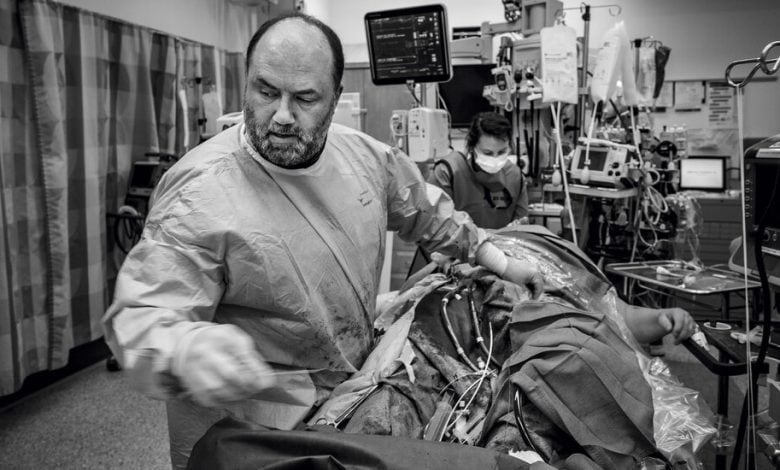The Race to Reinvent CPR

Greg Hayes, an emergency first responder in Chanhassen, Minn., was picking up takeout sushi when a 911 call came in: A 61-year-old had stopped breathing at home. Hayes and his team jumped in their ambulance and were soon pulling up in front of a suburban two-story house, where paramedics and other first responders were also arriving. All of them grabbed their equipment and raced through the open garage to find a man, gray and still, on the living-room floor with his wife and stepdaughter nearby.
Listen to this article, read by Emily Woo Zeller
Open this article in the New York Times Audio app on iOS.
Until that Thursday in August 2022, John Sauer’s most pressing health concern had been his seasonal allergies. After a routine day — desk job in front of a computer, a three-mile walk with his wife, some yardwork — he was sitting on the couch in front of the television with his wife, Kristen Waters. But when a commercial came on, he didn’t mute it as he usually did. Then, when his stepdaughter asked him a question about her car, he didn’t answer — he rolled his eyes at her instead. And he kept rolling them.
Waters, a nurse, checked for his pulse. His heart had stopped beating. She told her daughter to call 911, and the two women struggled to get Sauer, who is very tall and rather bulky, onto the ground to start CPR. Waters pushed up his sweaty T-shirt to expose his chest and began briskly pushing on his breastbone. She had taught CPR classes, but she had never done it on a real person. Up and down, up and down, her fingers interlocked, hand over hand. Sauer’s head bobbled limply around. Here I am doing chest compressions, she thought, and this CPR is never going to wake him up.
When Hayes arrived, he, too, didn’t think there was anything that he or the medics — or even a hospital — could do to save Sauer. Not that he wouldn’t give it, in his words, the “100 percent college try.” But having been an emergency medical technician for more than three decades, he knew how sudden cardiac arrests usually end: Sauer would probably die.
As the clock ticked toward 30 minutes from when Sauer’s heart stopped, the chance of his survival was dwindling rapidly to zero. Hayes began rehearsing in his head what he would say to Waters. He stared at a photo on the wall of Sauer white-water rafting with his family. “It was gut-wrenching,” he says.